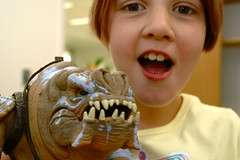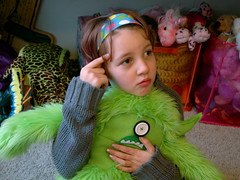"...Heaven have mercy on us all - Presbyterians and Pagans alike - for we are all somehow dreadfully cracked about the head, and sadly need mending." -- Melville (Moby-Dick)
-----
(Note to parents of kids with polymicrogyria: While I'm not normally one who worries a great deal about so-called "triggers", and while I'm writing this in large part on your behalf, I nevertheless feel like I should give you a heads up that I'm going to be talking about stuff that you are all-too-aware of but might not particularly enjoy reading about.)
I know I recently pledged to focus on the positive, and this post might not seem to honor that. But I actually think it does, because I believe clarity and respect are positive attributes, and I need to speak about those topics today.
I received a comment on this blog recently, from someone who has left critical comments before, and that's fine. I've posted them in the past because I really don't believe that it serves anyone, least of all me, to sanitize the comments left here. I've mentioned before that I will reject a comment if it is threatening or disparages anyone besides myself, or if it is clearly part of a coordinated campaign to dump on me for whatever reason. I think my comments become boring if they're all "go Rob" or "me too". But this comment I ultimately decided not to publish, because I felt like it could be offensive or hurtful to other family members of persons suffering from polymicrogyria, aka "Schuyler's monster".
But the remark stayed with me, if only because it's not even remotely the first time I've been confronted by the idea it contained. If I thought it represented one crank's opinion, then I would let it go. But the fact is, it doesn't, not by a long shot. So I guess I've changed my mind about posting it.
"What will become of your life when Schuyler's monster becomes her identity? Maybe she will grow to resent that you call what makes her a unique individual a 'monster' as if were a bad thing."
Like I said, the idea of Schuyler's polymicrogyria as a kind of unique personality trait rather than a serious and potentially dangerous affliction is hardly a new one. And I'm sure that I've made it even easier to make that claim. I recently said the following, after all:
Schuyler's polymicrogyria isn't her greatest challenge, not any more. Her life doesn't seem to be in any real danger, with no apparent seizures yet, and her monster doesn't impede her everyday life with the ferocity that it does for so many other PMG kids. For that, I am grateful.
I further explained that Schuyler's difference, her uniqueness, is something that I'm still thrilled by, and I consider it my distinct honor to be the person who gets to help lead her through a world that might not understand her difference, but which is nevertheless a much better, more vibrant place because of it.
So let me make this as clear as I can. I love Schuyler wildly, and I find her to be fascinating. I think she is by far the most interesting person I've ever known, and she's only eleven. And while I acknowledge that a huge part of that comes from the fact that I am her father, I am also aware that my fascination with the strange and wonderful person she is stems in no small part to the fact that I get to see into her unique world more than most people, more than anyone with the exception of Julie.
I think I've made that pretty clear in the past, in what, like 90% of what I write?
Here's the other thing, however. If I could have a chance to experience life with a Schuyler who was born free of her polymicrogyria, if I could go back in time and spend the past eleven years with a neurotypical version of Schuyler, I would do it in a heartbeat.
Because here's the thing that a statement like
"you call what makes her a unique individual a 'monster' as if were a bad thing" is sugarcoating:
Polymicrogyria is a bad thing.
Polymicrogyria, in its many forms, affects the lives of its victims in various ways, and all of them are bad things. The difficulties with swallowing that consign some PMG kids to a lifetime of liquified foods and bouts with choking and life-threatening pneumonia are bad things. The lack of speech that robs PMG patients of significant early communication and stunts their development both intellectually and socially for the rest of their lives, that is a bad thing. The accompanying cerebral palsy that many patients experience, the difficulty in walking, that is a bad thing. The cognitive issues that can range from a developmental delay to severe intellectual disability, those issues are very bad things indeed, no matter how you spin them.
And the seizures, the ones that Schuyler is still in danger of developing, those terrifying episodes that strike some PMG patients at birth, those powerful electrical hurricanes swirling in those young, innocent brains that rob many very young polymicrogyria patients of their very lives before they reach their first birthdays, those are very very bad things. I follow polymicrogyria discussion boards, I see the notices that some young person has been killed by that thing that makes these kids such "unique individuals". I haven't experienced the pain that so many polymicrogyria families and those who battle other similar disorders like microcephaly and Angelman Syndrome have gone through, but I've witnessed the devastation that many of them endure.
And I never let myself forget, because it would be a crime of hubris to do so, that at any time, especially now as Schuyler's body and brain begin to undergo a whole new world of changes, our own world could be rocked, and that Schuyler's monster could grow some very big teeth.
So yeah. I feel comfortable calling it a monster, and while I celebrate Schuyler's individuality and always will, I also recognize that it has come with a price, one that she pays and will continue to pay all by herself. And I call it unfair, because it IS unfair, that she will not have the opportunity to choose her own individuality, her own path, without the unfeeling hand of that monster writing much of her narrative for her.
I understand how many people in the disability community choose to embrace disability rather than fight it. I get the Holland poem, and I understand that it means a lot to many people, even if I reject it. But I do reject it, as I reject the embrace of disability as just another thing that makes our kids and our loved ones who they are. It feels wrong to me, almost like a kind of fetishization of disease or disability.
I am not moved either way if you feel that way about your own afflicted family or your own disability. Everyone makes their own way as best as they can, and I respect that. But I find it offensive if you suggest that I should do the same, and that I should embrace the thing that, yes, breaks my child and which torments so many of her neuro-atypical brothers and sisters with such ferocity. It is a bad thing, as far as I am concerned, and I will call it a monster.
I started using the monster metaphor (stolen from Schuyler, if I'm being honest) long before I wrote a memoir, but it wasn't until an interviewer asked me about it during the press attention that the book generated after its release that I gave it much thought. I realized that it was a metaphor that I embraced, not for literary purposes but for personal ones. Like Schuyler, I needed to imagine polymicrogyria as a monster, because I can't fight a little girl's broken brain. But I can fight a monster. I can imagine myself going into battle against one of those.
And I don't even envision that fight as something heroic, either. Maybe I did, in the beginning, but not now. I'm not Perseus, heroically outsmarting and killing archaic beasts. I'm not St. George slaying the dragon.
If anything, I am more like Captain Ahab, fighting obsessively against a monster that I can never defeat. Like Ahab, I am aware of the futility, but I am also unable to turn away.
Schuyler's affliction, the one that hurts and kills other children, the one that touches her more gently than some but still colors her life so completely, it is a monster. If someone comes here to try to make a case that it's not, and that it is simply one of the innocent, beautiful little parts of her personality that make her the purple snowflake that she is, they should do so knowing that I will disagree, and I will find their disrespect for this bad thing to be offensive.
Melville's description of the sea (
"...this velvet paw but conceals a remorseless fang") works pretty well for Schuyler's manifestation of polymicrogyria. It's not cute. It makes Schuyler's life hard, and moreover it devastates and even takes away the lives of others. I'm with Ahab on this one. I'll never quit.
Thus, I give up the spear.





















